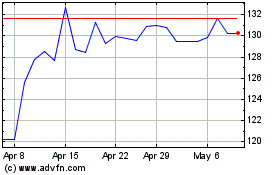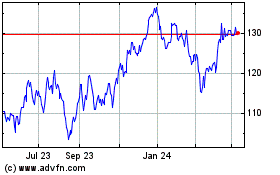Rio Tinto Developing Process to Use Biomass for Making Steel
14 October 2021 - 12:29AM
Dow Jones News
By Rhiannon Hoyle
Rio Tinto PLC said it is developing a way for biomass to replace
coking coal in steelmaking as the mining giant seeks to safeguard
demand for iron ore, its most lucrative business.
The world's second largest mining company by market value is
testing a process at a small-scale pilot plant in Germany, which
uses raw biomass with microwave technology to convert iron ore to
metallic iron without the need for coal.
"We are encouraged by early testing results of this new process,
which could provide a cost-efficient way to produce low-carbon
steel from our Pilbara iron ore," said Rio Tinto's iron ore chief
executive, Simon Trott. The Anglo-Australian miner said it has a
patent pending on the process.
Rio Tinto, which stopped mining coal in 2018, is the world's top
producer of iron ore alongside Brazil's Vale SA.
The company doesn't make steel, however Rio Tinto and other top
miners have become increasingly concerned about the outlook for
commodities used in energy-intensive industries such as steel as a
global push to cut carbon emissions gathers pace. More than 70% of
Rio Tinto's so-called Scope 3 emissions--greenhouse gases related
to its products but outside the company's direct operational
control--are generated when its iron-ore customers turn the
commodity into steel.
Rio Tinto said the biomass project is one of a number of avenues
it is pursuing in a bid to reduce steel-industry emissions.
The company earlier this year set targets for lowering Scope 3
emissions that included a goal to invest in technologies that could
cut the carbon intensity of producing steel by at least 30% from
2030.
Rio Tinto said it will need to work out how to source enough
sustainable biomass to run the process on a commercial scale.
Critics say the use of biomass can cause deforestation and affect
food supply.
The process it is trialing in Germany uses plant matter known as
lignocellulosic biomass, which would include wheat straw, corn
stover and purpose-grown crops. The company said it cannot use
foods such as sugar or corn and would not use biomass sources that
support logging of old-growth forests.
"We know there are complex issues related to biomass sourcing
and use and there is a lot more work to do for this to be a
genuinely sustainable solution for steelmaking," said Mr.
Trott.
Write to Rhiannon Hoyle at rhiannon.hoyle@wsj.com
(END) Dow Jones Newswires
October 13, 2021 09:14 ET (13:14 GMT)
Copyright (c) 2021 Dow Jones & Company, Inc.
Rio Tinto (ASX:RIO)
Historical Stock Chart
From Mar 2024 to Apr 2024

Rio Tinto (ASX:RIO)
Historical Stock Chart
From Apr 2023 to Apr 2024
